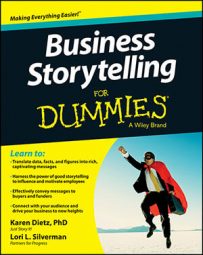Sometimes the key message for your business easily pops out of the story. Most times it doesn’t. When it doesn’t, start by identifying all the themes that the raw story covers. Themes are the subjects or topics covered by the story. Here are a few examples of story themes:
Creativity and innovation
Revenge
Courage
Leadership
Assertiveness
Teamwork and collaboration
Perseverance
Helpfulness
Now identify the themes in the raw story you selected. Read it out loud, whether you recorded and transcribed it or wrote it down. Go over the bullet points or storyboard and talk out the details if you used that approach. Watch the video if you captured it that way.
This is important. Don’t shortchange yourself by only thinking about the series of events. Ask, “What themes are embodied in this story?” Write them down. Then, whittle down the list to those critical few that best fit the story. Now you’ve got a place to start figuring out the story’s key message.
To aid you in identifying themes, this is the time to get a handle on the potential audiences for the story — the individuals and groups you may share it with — and their needs and desires. If there are several potential audiences, pick one for now. Picture this individual or group in your mind. Take some notes while asking yourself the following:
Who are they (demographics — age range, education, professions, and so on)?
What are they wrestling with?
What are they feeling and experiencing?
What answers are they searching for?
Given these responses, what themes have emerged in your raw story and how aligned are they with the audience needs you’ve identified?
Keep these notes handy. The more closely you’re acquainted with your audience’s pains, fears, needs, and aspirations, the better equipped you’ll be in pinpointing the story’s key message. This information will also aid you in crafting the story so that it really resonates with them.

